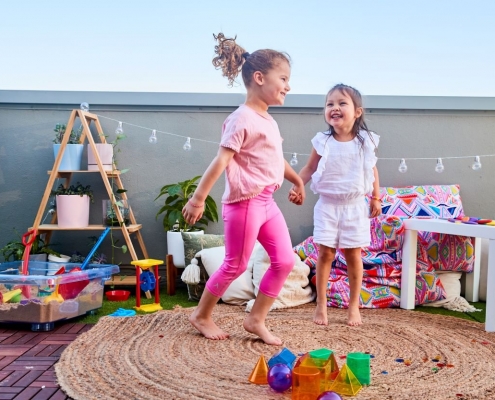Why is it important to play with your child
Connecting as a Family Through Play:
Why it’s so important and what to do
“The family – that dear octopus from whose tentacles we never quite escape, nor, in our inmost hearts, ever quite wish to.” Dodie Smith
When I think back to my childhood, the memories that I hold most fondly are those times I spent playing, not on my own, but with others. The long train journeys to Cornwall playing cards with my dad were so important in connecting with him – a father who was often absent through work. What about your memorable moments with family members? Take a second to remember what you did together and how it made you feel…
It’s not just about happy memories and the positive emotions these bring. Playful family moments have many purposes. We know that play, in and of itself, is hugely important for children’s emotional development see the previous article Being with Nature – the benefits of outdoor play but there are added bonuses if it’s in the context of a relationship. This article focuses on why it is so important to play together as a family and how you can make this time more meaningful.
Playing together helps develop our nervous system
Playing with others actually has an important neurological purpose. We are wired to become emotionally close to certain individuals and play is one way in which we achieve this. Neuroscientist Stephen Porges has developed the Polyvagal theory which describes how the roots of play are linked to the development of a neural mechanism that helps us recognise and respond to danger1. (Bear with me here – this is fascinating stuff but a bit scientific!).
Unlike other animals, who generally survive threats through fleeing, fighting or freezing, mammals have developed a social engagement system. This allows humans to look around and read the voices, faces and bodies of other humans to help assess whether they are in danger. If we feel safe, we are able to calm our physiological state and use others to help us manage and respond to our environment in the way that many animals aren’t.
We are born with our social engagement system “online” and it is strengthened through playful interactions. In fact, play starts in utero – when we rub our pregnant tummies our baby response with a little kick. The more we engage this system the more we are able to inhibit the neural circuit that leads straight to old survival responses. When we learn to be influenced by other people’s reactions (rather than just our basic survival instincts) our heart rate and breathing slows down, our blood pressure drops and our stress response switches off. So, playing with your child actually helps them feel safer and more able to use others to help when they are in danger (I told you it was fascinating!).
It’s only certain types of play that helps us develop this social engagement system – those which consist of face-to-face interactions which are reciprocal and attuned with a mixture of activating and calming games. Take peek-a-boo as an example – we disappear from a child’s view, leading them to feel a bit stressed, then return to diffuse the stress through socially engaging with them. If we don’t return, they’ll manage that stress by using their more primitive systems and won’t learn that human interactions can help calm them down.
Sadly, in my work with traumatised children, I often see children who have “switched” off their social engagement system due to a lack of positive interactions with their parents and they are affected negatively by this in so many ways – physiologically stressed, finding it hard to trust and having to cope alone.

The benefits of playing together
The best inheritance a parent can give to his children is a few minutes of their time each day.” (Grundler)
As well as having a positive impact on their nervous system, playing with children from early on helps them in a number of ways. They become more resilient, learn to trust in others and navigate relationships, are better able to manage their feelings and develop a sense of belonging. Children who spend more quality time with their parents show better behaviour, are quicker to develop skills such as empathy and are likely to be less stressed.
They also learn valuable skills such as sharing, problem-solving and decision-making. Early experiences of playful connections within the family set up a template for how children view and engage in the world and are an important aspect of developing a healthy attachment relationship and learning that there is fun to be had and that they are interesting and worth being noticed.
And it’s not just about children. Play that focuses upon connection can be extremely beneficial for parents too. There is a complex neurochemistry underlying mother-child bonding, as described by Cozolino; “through a biochemical cascade, mother-child interactions stimulate the secretion of oxytocin, prolactin, endorphins and dopamine, which create positive and rewarding feelings. When you are bonding through play both of your bodies will release feel-good chemicals which relax the body, increase positive feelings and improve relationships. It’s a win-win situation!
The more moments of playful connection you have together the easier it is to reconnect when things aren’t going so well and the more able you all are to handle unhelpful aspects of your relationship. There’s even evidence that playing with your child strengthens your “parenting brain” – it helps us integrate those parts of the brain that are most important in parenting, enhancing our ability to read our children, make meaning of their behaviours and enjoy their company. (If you want to delve further into this then have a look at Brain-based Parenting by Dan Hughes and Jon Baylin3).
Posted by Dr Sarah Mundy, Consultant Clinical Psychologist and Author of Parenting Through Stories



